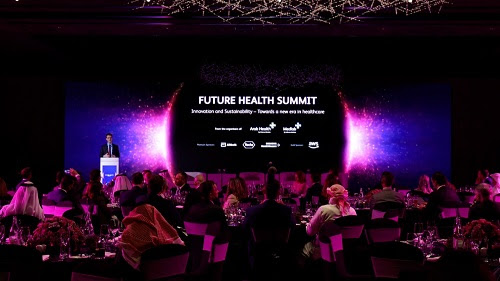The invitation-only, in-person summit, organised by the MENA region’s leading exhibitions for the healthcare industry, Arab Health and Medlab Middle East, addressed some of the most critical issues impacting the global healthcare industry and the barriers and opportunities for securing sustainable healthcare for all.
Open remarks were made by H.E Dr Amin Hussain Al Ameeri, Asst. Undersecretary of Health Regulation Sector, UAE Ministry of Health and Prevention. Lord Stephen Carter, Baron Carter of Barnes, CEO Informa, welcomed guests and underscored the importance of the healthcare industry coming together to discuss and debate the way forward. He said, “First and foremost, it is a testament to the discipline, the professionalism, and the dedication of the authorities in the UAE to make this a safe place for people to meet, to trade, to learn, and to transact. What we are seeing at Arab Health and Medlab Middle East is a showcase at the beginning of the year for the rest of the world as we begin to see ourselves move on from the pandemic.”
“We hope that as we move from pandemic to endemic, as we learn to live alongside a change in circumstance and everything that goes with it, we can share those learnings.”
“If we’ve learned nothing over the last two years, we’ve learned that sustainability and innovations are now centre stage for countries, for companies and industrial sectors. And I know of no topics that are more important for the markets we serve.”
One of the highlights of the evening was a panel discussion focused on sustainability, innovation, and the future of healthcare.
Moderated by Marwan Abdulaziz Janahi, Managing Director, Dubai Science Park with panellists included; Dr Alaa Murabit, Medical Doctor, Global Security Strategist, Women’s Rights Advocate and United Nations High-Level Commissioner on Health, Employment & Economic Growth; Dr Sameh El-Saharty, Program Leader for Human Development, GCC Country Department, The World Bank; and Veronica Beneitez Piñero, Deputy Head of Unit, Transition and Business, European Commission.
The group explored the innovative concepts in securing sustainable healthcare, addressing healthcare reform, gaining efficiencies in healthcare spending, and capitalising on the transformative power of the digital era.
Discussing the actions required to strengthen health financing systems, especially for lower-income countries, Dr Alaa said, “It has been an advocacy of the healthcare community to urge and usher in universal healthcare as a shared understanding that health care is a fundamental human right. What we have seen the most clearly in countries that are accountable for the percentage of financing that they put into health care and hold themselves accountable to that number have done best. Nigeria is a good example of this.”
One of the key learning from the panel discussion was the importance of recognising health system should not be looked upon in silo, as every government department has a role to play.
According to Dr Saameh, only 20% of healthcare outcomes result from healthcare delivery systems. He said, “Clinics and hospitals contribute only 20% of health outcomes surprisingly 80% are due to socio-economic, behavioural, and environmental factors.”
“I think there is a role for different sectors to play in terms of improving health outcomes. Road safety, banning smoking and adding taxes to tobacco products, healthy eating in schools for children, these are the roles of many different government departments, but they need to come together for the benefit of the healthcare sector.”
As part of the evening, a range of cutting-edge technologies was showcased by leading innovators within the healthcare and laboratory sector. They included insights from Ionut Taranu, Head of Marketing and Healthcare Consulting, Roche Middle East, who underscored the importance of developing strong partnerships. He was joined by Dr Bernd Onesorge, President EMEA, Siemens Healthcare, who outlined the latest innovations in healthcare, while Damian Halloran, VP Infectious Disease, Emerging Markets, Rapid Diagnostics, Abbot Laboratories, outlined the future of rapid diagnostics.

